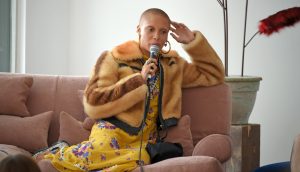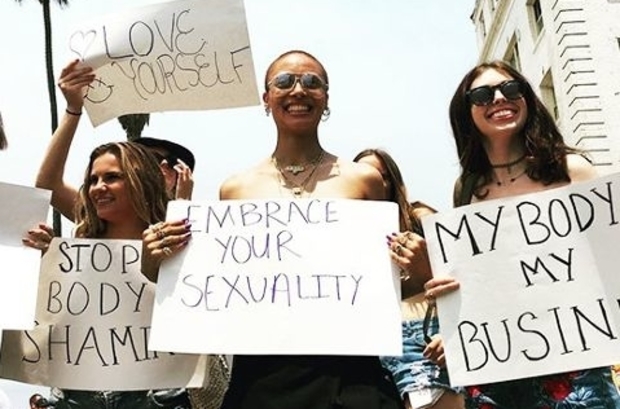Flossie Wildblood and Sophie Nevrkla discuss feminism, sex and desire at Gurls Talk’s takeover of 180 The Strand in July.
It is the final hour of Gurls Talk’s inaugural London event and the world-renowned model Adwoa Aboah is talking about cum, clitorises and – everyone’s favourite – the UTI. She’s speaking in a space decked out to look more like a living room than a smart auditorium, to an audience made up almost exclusively of young women. Her co-panelists, too, have all experienced the politics of womanhood in some form: there’s fellow model Hanne Gaby Odiele, who came out as intersex earlier this year and has since become an advocate and activist for the community, award-winning author and journalist Laurie Penny, and publisher and dominatrix Reba Maybury. Themed loosely around female sexual identity, the panel exemplifies everything that Gurls Talk, ‘a movement that aims to create a platform where girls can openly share experiences in a safe and trusting environment’, stands for — and it seems to be working. With this glorified living room as their platform, high-profile figures discuss experiences that would never make it onto a press release, with results that appear both cathartic and constructive. On paper, thanks to the stigma that stops women in the public eye from speaking up about less ‘palatable’ matters, it seems an unnatural arrangement. In reality, far from it.
The panellists are gaining as much as they are giving, sharing ‘compromising’ anecdotes that incite knowing laughter from an audience who can, for better or worse, relate. And as light-hearted as all this chat about orgasms (or rather – a lack thereof) might sound, it paves the way for more political, impersonal analysis. As the panel touch on taboo after taboo, the atmosphere becomes one of camaraderie as opposed to one of judgment; the audience ask questions and share their own stories along the way.

So far, Gurls Talk’s one-day takeover of 180 The Strand has felt a little superficial, slightly too preoccupied with maintaining an Insta-worthy aesthetic. For all its admirable intentions, the project is still a work in progress. ‘I am learning from everyone I talk to, I’m learning from the mistakes I’ve been making, even in the process of this event’, Aboah told Refinery 29. This discussion feels like part of a learning process: she is still trying to define her own feminism and, accordingly, what she wants Gurls Talk to be. For all its faults, such a searching, inquisitive approach actually proves powerful. Rare is it to see a panel whose ideas form and reform as they talk to one another – it is infinitely more exciting than a set of pre-packaged, rehearsed thoughts, delivered to an audience on autopilot. After all, we are all constant works-in-progress, learning as we go. We are permeable beings who learn from experience, and from the ideas of those around us. There is a definite sense that the issues discussed will become central to the future of Gurls Talk as it grows and becomes more meaningful.
‘What does being a woman mean to you?’, the panel chair asks to kick things off. The answers are wide-ranging. Femininity signifies something different to each panellist — a reminder that it cannot be comprehensively defined or squashed into a box. But on top of this, to be a woman is also to have numerous identities thrust upon you; it is, as Penny puts it, to navigate ‘a set of conditions and expectations that you didn’t choose’. This is true on a particularly literal level for Odiele, whose testes and natural male hormones were removed at birth in a standard practice known as intersex genital mutilation. In this case, doctors played god: they quite literally decided Odiele’s gender for her, in the most invasive of ways. She only discovered her true identity when her parents told her, aged 17. Odiele describes coming out as intersex earlier this year as a ‘fight against shame’, a proud reclamation of her own selfhood. Being intersex is an important facet of who she is, but it is also not the only thing that defines her.
More generally, the space society carves out for women as soon as they’re able to play with pink toys and watch Sleeping Beauty is a minefield — decisions are made for us and we are shamed if we don’t cooperate. As girls get older and their identity becomes inextricably linked with their sexuality, scrutiny only increases. The male gaze might allow for a multi-faceted identity, but only insofar as women being one person in the streets and someone entirely different in the sheets. It does not allow for the capacity of women to feel ‘a thousand different sorts of emotions all at the same time’, as Aboah says. Rather, it is reductive. Women are not expected to deviate from the narrow ‘sexuality’ they are prescribed as objects of male desire, just as they are expected to toe the line in other areas of life. To speak up is to depart from passivity and to originate a narrative of your own.

In a world that can’t stop talking about sex, the narrative around female sexuality remains narrow at best. Media dialogue revolves around rape and abortion, and while these stories must be told, telling them alone fuels a narrative whereby sex is something done to us — not with us. Penny recounts how she has written about her experience of rape but never about her pleasurable sexual experiences, something she has, of late, resolved to change. Porn, too, fuels the idea of sex as yet another space where men can assert their dominance: it is scripted by men, for men. Nothing much has changed since Louis Theroux’s 1997 documentary Twilight of the Porn Stars – though female focused porn websites do exist now, these are often sexist in their own way, and succumb to a clichéd fantasy of womanhood (pink bedsheets, fairy lights, and so on). Maybury talks about the danger of pornography as another way of controlling women – it is, she argues, 98% male centred. Even lesbian porn is, largely speaking, conducted through the male gaze, for male pleasure. Seeing as (according to recent research), many people have watched porn by the age of 12, this is a worrying pattern. Our desires are constantly being defined by others, and women made out to be curiously lacking in sexual agency at every turn. As Penny eventually sums up: ‘no one is really talking about a woman’s right to have the kind of sex she wants.’
Men lead the narrative in the private sphere as much as the public sphere. As Penny so wisely says, we are taught early on how to say no; rarely do we think about what we might say yes to. If you are a woman, sex is something to fear, not want: ‘desire’ becomes a dirty word, synonymous with shame. Rare is it to see a depiction of a sexually confident, liberated woman in the media without her feeling a sense of regret afterwards. Even Sex and the City’s Samantha (possibly the best example we’ve got) is a source of permanent comic potential – some of the time, it is uncertain whether we are supposed to be laughing with or at her. And why must we laugh at all? Why is female sexuality continually derided and mocked? This double standard is as old as time. In Tess of the D’Urbervilles, when Angel confesses the sexual dalliances of his youth, Tess forgives him wholeheartedly; when she does the same, he deserts her: ‘You were one person; now you are another.’ Women are taught that the less sex we have, the more we withhold ourselves, the more power we have.

This notion of a war against embarrassment is echoed across the panel. Maybury talks at length about the importance of reversing the dynamic of oppression and submission; Aboah says ‘I am still learning how to celebrate what I want; I need to teach myself that it’s ok to want things!’. She is right – as women, we are taught to be apologetic for taking up space, for asserting ourselves. Sex should be a mutual exercise: initiating sex and asking for what we want in the bedroom should be as easy for women as it is for men. We should, says Odiele (in a phrase she returns to throughout the talk), ‘fight against shame’, be unafraid to take up space and be vocal.
Being a woman is, by default, a challenging political experience, but it is just as much about ‘understanding the power that surrounds us’ (Maybury) and coming to terms with how best to use this power to our advantage. As women in the 21st century, we must actively speak out against systems set up to self-perpetuate, and move towards deciding things for ourselves in a society that decides everything for us. Modern femininity should be about asserting ourselves and asking questions, no matter how daring those questions may seem. Indeed, Aboah leaves us with a statement on the power of the ‘unapologetically open’ attitude of today’s youth. Openness, she says, is the only way to start a conversation.
Featured image courtesy of whowhatwear.co.uk





